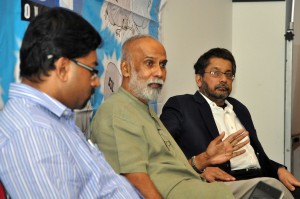Politicians, media blamed for ‘unrealistic’ expectations
Politicians and the media have helped to unrealistically lift the expectations of people and the corporate sector in a budget. “These are false expectations and not do-able,” said Anura Ekanayake, a former Chairman of the Ceylon Chamber of Commerce (CCC).
Speaking at a post-budget, in-house panel discussion organized by the Business Times at the Wijeya Newspapers Ltd auditorium in Colombo on Wednesday, Dr. Ekanayake said the politicians and the media have pumped up the people to believe that the budget wil reduce the cost of living, create more jobs or provide tax concessions to the private sector.
“The budget is all about income and expenditure of the state. If the expenditure is higher than income, then the deficit will increase sharply. That is inevitable and in this scenario expecting tax breaks or ‘goodies’ is an issue,” he said, at a discussions on the “Budget, the economy and society.”

Panellists: B.Skanthakumar, Dr. Anura Ekanayake and Dr. Saman Kelegama. Pic by Indika Handuwala
However in a counter argument, Balasingham Skanthakumar, a Social Scientist and trained lawyer, said the middle class consumer doesn’t expect much in the budget except that it should not harm the individual through additional living costs. A “No Pain; No Gain” kind of budget is what ‘Citizen Kumar’ would look forward to, he added. Tackling the issues of ‘what do budgets mean to the ordinary masses’, he said, “The immediate reaction of people I spoke (to prepare for this discussion) is a sense of cynicism and pessimism. The cynicism in the budget is that there are always good things (according to the presenter) but no bad things”.
The discussion which included a contribution by Dr. Saman Kelegama, Executive Director at the Institute of Policy Studies (IPS) on the economy, dealt with economic issues, progress in business and budgets vis-à-vis the people and their expectations.Dr. Kelegama said that since various efforts to develop a public-private partnership in infrastructure development have not succeeded in the past, the Government to fast-track this development in the post-war period resorted to debt-driven investments through debt financing. This development is entirely state-driven.
While it is an inevitable option since public-private partnerships have failed and the country, on the other hand needs such development, he agrees that on the long term this model is not sustainable as it is a roll-over debt structure. Debts are paid by borrowing, which though a practice adopted by other countries, is not sustainable on the long run.
Many of these projects are also not giving immediate returns. “We have to get the maximum amount of foreign exchange. We need foreign exchange to repay these debts and for that we need to increase export revenues,” he noted.
Dr. Kelegama also raised the issue of rising interests making borrowing costlier. Interest rates are now at 9 per cent compared to a time when Sri Lanka borrowed at 6-7 percent.
The discussion which included input by Sunday Times journalists and invited guests, raised some interesting points of how the economy should be developed, the people’s expectations or non-expectations from the budget, and other issues of public concern. An interesting point was raised by Dr. Ekanayake in that the public servant is not obliged to serve the people if the new terminology is taken into account.
“Public servants are now designated as ‘Government servants’. The very meaning of the designation implies they have to serve the Government (in power) and not the public. The Government is the master of the official, not the public (who pays their salaries, perks, pensions through taxes, etc),” he said.
On the cost of living issue, while there was agreement that inevitably prices have to rise, inflation has to rise, the point was made that income levels are, reciprocally not increasing in tandem with prices of essential goods. “So while prices must rise (they cannot always remain at the same levels), incomes must also rise to be able to pay these prices. That balance is not happening,” said one journalist.
Dr. Ekanayake also said while subsidies or wage increases are provided, consumers on the other hand they pay more than these benefits through indirect taxes.
It was also pointed out in the discussion that foreign investment inflows were mainly in the services sector and not manufacturing which is the sector that creates jobs and raises export income.



